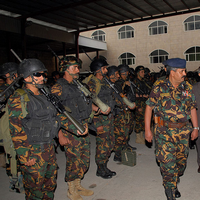As part of its escalating campaign against Islamic terrorists based in Yemen, the U.S. government has expanded efforts to crack down on terrorist financiers in the Middle Eastern country. But the counter-finance approach in Yemen is complicated by the same factors that have stymied similar efforts in Iraq and Afghanistan. Extremists operate increasingly cheaply -- and what little money they do require, they can often raise without outside help.
Yemen is increasingly a terror crossroads. U.S. Army Maj. Nidal Hassan, who killed 13 fellow soldiers in a November shooting at Fort Hood in Texas, reportedly had ties to radical Muslim cleric Anwar Al Awlaki, who lives in Yemen and is believed to be a spiritual adviser to al-Qaida in the Arabian Peninsula (AQAP), an apparent affiliate of the main al-Qaida organization.
AQAP also claimed credit for the Christmas Day airline bombing attempt, in which Nigerian Umar Farouk Abdulmutallab, a passenger on a Detroit-bound Northwest Airlines flight, allegedly tried to ignite a bomb concealed in his underwear. Abdulmutallab had reportedly met with AQAP in Yemen and may also have had ties to Awlaki.

